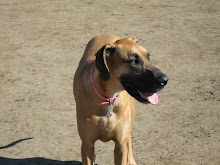You live with a predator.
He is not human.
He is armed with fangs for slashing flesh and molars for crushing bone. His jaw may exert nine hundred pounds per square inch of pressure. He has forty-two teeth in all.
His sense of smell is so powerful that we, with our human limitations, can barely comprehend. Our olfactory sense does not detect odors unless they are painfully obvious. The nose of this more efficient hunter collects and concentrates minute traces of scent until they create a mental picture more detailed than a visual image. When he smells the ground, he knows every thing that has passed within many, many hours, days even.
While our human eyes process a wealth of colorful detail, his eyes are specialized organs tuned to detect movement above all.
Aligned above his eyes and nose, aimed forward, preternatural ears detect frequencies and sound which easily escape us. Noises such as the softest rodent squeak beneath a thick blanket of snow do not evade him. The footfall of a stranger on an outside porch step does not escape his attention. He hears the breath of large prey even from a distance.
He is swift. The fastest of his kind can sprint at forty miles per hour, covering ten feet in a single bound.
He is agile and he is strong. He can crawl. He can jump. He has a high ratio of muscle to fat. He is an efficient predator. A carnivore designed to detect prey, catch it, to kill, to eat, to reproduce.
He is a social animal. Left to his own kind, he will live in a clearly organized pack led by a dominant male and a dominant female. Serious challenges to the social structure will be met swiftly and violently. Yet a strong survival and social instinct inhibits this killer from harming his own kind unless necessary to maintain order. Thus, he speaks a complex and rich language with which he can advertise his intentions. He assures his pack mates that he means no harm, but that he will defend his rank within the pack.
He is an animal. He is a predator. He is opportunistic. He understands social order, his place in that order, and lacking strong leadership from above, he is ready to assume control of his pack. He is ready to defend his pack from outsiders. And he is ready to protect it from social unrest within.
He is your dog.
He has forsaken life with his kind to inhabit your world. But he has not forsaken his nature. He retains his predatory nature. He remains a social animal. You and your family members are his pack mates. You are his leader.
Or he is yours.
Make no mistake about it. Your dog understands the hierarchy in his pack, the organizational flow chart if you will. He will yield to pack mates above him on the chart, but not below.
For example, if you give your dog a high value treat such as a meaty bone, can you take it away? Does your dog remove the bone and run away with it as soon as you’ve given it? That is a low level form of resource guarding behavior. Higher up on the scale is when your dog freezes and stiffens over the bone. In his language, your dog is very clearly stating an intention to guard the resource.
The only question is to what length he will go in order to retain it. Perhaps he is bluffing. If you reach in closer to touch the bone he may give it up. Or perhaps he will begin to growl, stiffening further over the treat, revealing his fangs. Whether he decides to bite you is a question determined not only by his perception of your ranking versus his, but also by the level of aggression he is willing to employ in defending this resource from you on this day.
If he is your leader, then he decides whether or not you touch the bone, and if that act will cost you an injury. If you are his leader, then when you make clear your intent to take the bone, he drops it into your hand without protest.
Dogs do not bite by accident. They decide. They choose. They make conscious decisions in a split second. If your dog permits you to take food and other valuable resources away and is willing to follow your direction, chances are good that he regards you as his leader. Therefore, he will give you all the privileges due your rank.
However, you may find that the dog does not treat all members of your family the same. If he respects you, but not your spouse or children, this can lead to serious problems. Be on the look out for ranking issues in the family.
If you find that your dog does not accept your leadership role, consider contacting us or another professional dog trainer to assist you. Not all dominant dogs are aggressive. Some dogs are very benign dictators who never bother to reinforce their rules upon you. But if your dog is the leader in your home, things can go wrong in this backward relationship.
The beauty of dog training is that, much like counseling, it can put the relationship back on track so the love affair can flourish.
About The Author Marc Goldberg is a dog trainer specializing in the rehabilitation of difficult dogs and improving relationships. He is Vice President of the International Association of Canine Professionals (IACP) and Editor of SafeHands Journal. The author also educates professional dog trainers in his techniques. Visit him on the web at http://www.chicagodogtrainer.com or http://www.dogtraininginchicago.com. http://www.chicagodogtrainer.com
Keywords: dog toys, dog beds, dog collars, pet supplies, dog training, dog health
Subscribe to:
Post Comments (Atom)






No comments:
Post a Comment